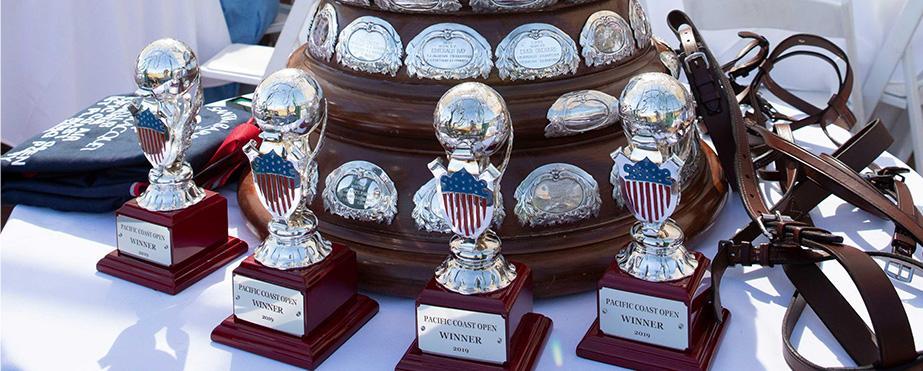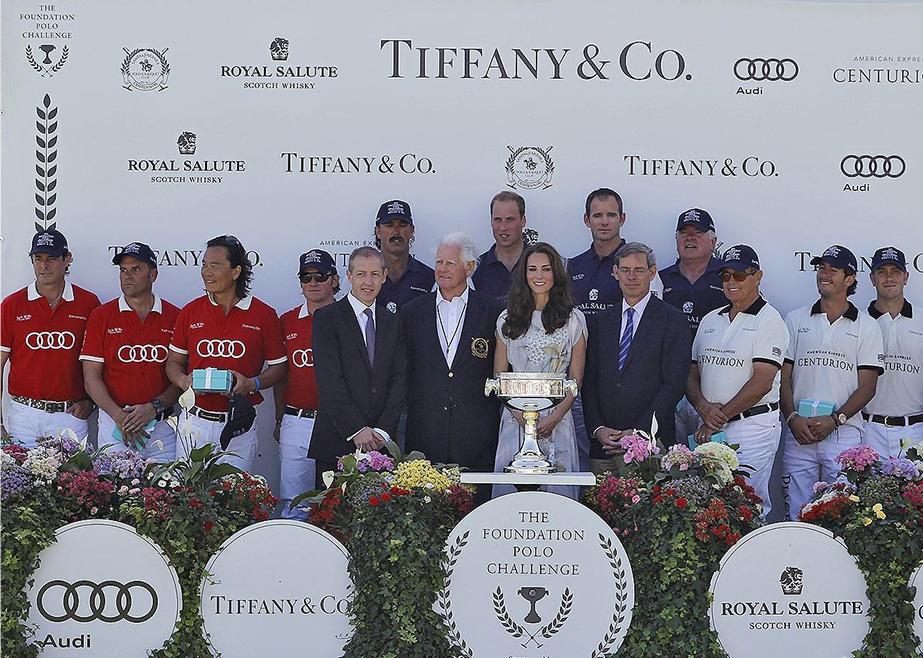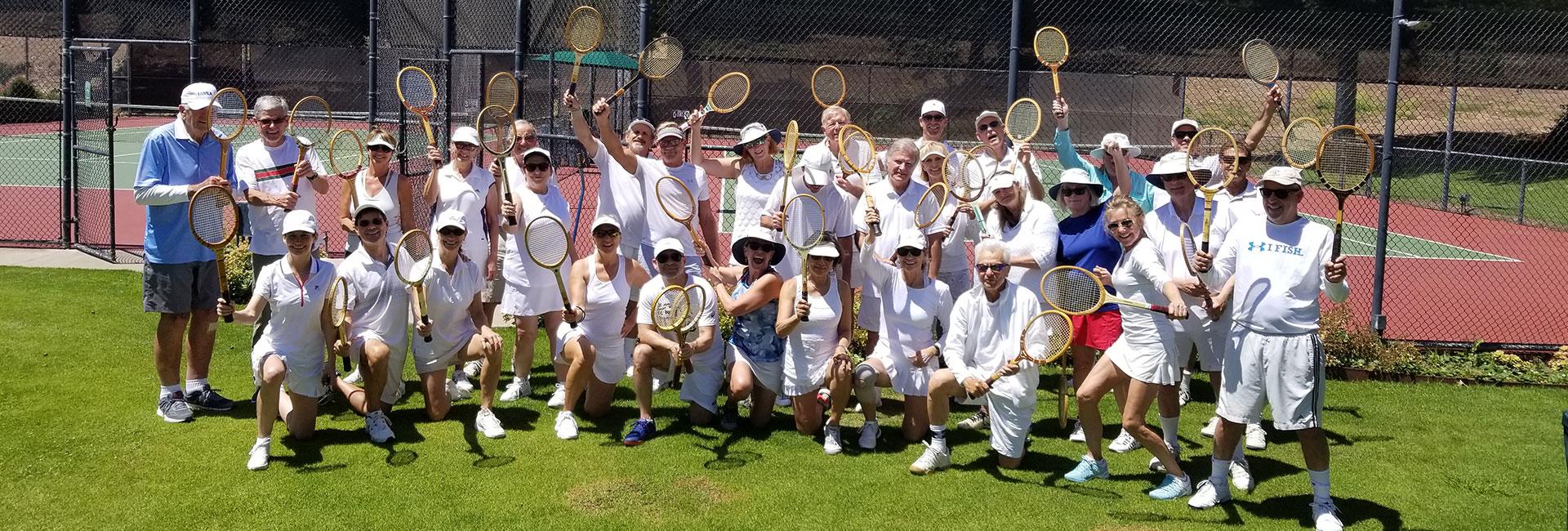We are fortunate to have such a rich history with being the third oldest United States Polo Association, (U.S.P.A.) Club still in existence in the United States. Much of our antiquity includes many special tournaments, in memory and celebration of special people.
Pacific Coast Open Trophy
This is one of the oldest polo tournaments in the world and the most prestigious polo tournament in the Western United States.
The cup was commissioned in 1908 by friends and members of the Coronado Country Club in California. First competed for in 1909, it was initially known as The All America Trophy, The International Challenge Trophy, The Pacific Coast All American Trophy and eventually in 1929 the Pacific Coast Open Championship Trophy. This trophy could only be awarded if at least two teams from outside of California were competing. When a polo team from England won the trophy in the second year 1910, it was proudly taken overseas to England, until it made its way back to Coronado the following year, where the tournament remained until the early 1920s. Throughout the late 1920s until the early 1940s the tournament was hosted by numerous California clubs for no more than a few years before switching to another. After World War II, the tournament moved to Beverly Hills Polo Club and found its permanent home in Santa Barbara in 1952. Standing at a striking height of five feet, the glorious silver-and-gold trophy crowned with an eagle supporting a globe and adorned with semiprecious stones, the trophy mounted on a redwood base with side panels depicting lively polo scenes is a dazzling site and the crown jewel of the season at Santa Barbara Polo Club. There were 5 years when the tournament was not played: 1970-75. California 9-goaler Eric Pedley holds the record for the most PCO wins with a total of 12 titles, an astounding record, Cecil Smith holds the second most titles with an equally impressive 7 total wins. In contemporary tournament history, Memo Gracida leads the field with 5 titles, spanning three decades.
Pacific Coast Open Best Playing Pony Award
1982: Donated by Daniel & Linda Walker to recognize the best horse in this High Goal tournament. The horses participation in this sport is a key ingredient to the success of any polo player.

Silver Cup
This tournament originally known as the Junior Polo Championship is the oldest of the American polo trophies. It was presented in 1900 by Samuel D. Warren, president of Dedham Polo Club near Boston and first played at Brookline Country Club, Massachusetts when the Philadelphia 1st team bested Rockaway 8 ½-3 ¼ to win the inaugural Cup. In 1900 no individual player with a handicap above 5 was allowed to play but in 1938 the handicap limit on a player was lifted. The Junior Championship attracted such historic teams as Rockaway, Cooperstown, Meadow Brook, Old Aiken and Hurricanes, to name a few. The 1935 Junior Championship boasted the largest field in the tournament’s history with 11 teams vying for the coveted trophy at Burnt Mills Polo Club, Bedminster, New Jersey when Aiken Knights triumphed over Texas 13-3. The venue for the tournament changed through the passage of time. In 1938 the Junior Polo Championship was renamed the National Twenty Goal Championship a North American Polo League event, the last one before the NAPL announced it would suspend operations. From 1940-1973 the tournament was hosted by Milwaukee Polo Club. The tournament was played as a 16 goal from 1964 to 1973 inclusive. In 1964 the teams were Palm Desert vs. Beverly Hills (PD won 8 to 5) and in 1965 Santa Barbara vs. Crescents (SB won 11 to 10). It seems those two years were the only tournaments played on the west coast in the ten years it was at 16 goal level. In 1974 the tournament relocated to Willow Bend Polo Club, Dallas and the name was changed to the Silver Cup. For the next 22 years the tournament was played in the Southwest circuit, moving from Dallas to Retama Polo Center, San Antonio to Broadacres Polo Club, Norman, Oklahoma and finally to Houston Polo Club. The most successful teams for the Silver Cup during the period were those fielded by the Busch family under the banners of Grant's Manor Farm and Budlight with a total of 6 wins (1991 to 1998) along an 8 year span. In 2007 the Silver Cup moved again to New Bridge Polo Club, Aiken South Carolina. In 2011 the tournament relocated to Santa Barbara Polo Club. In 2017 the Silver Cup returned to the East Coast at Greenwich Polo Club, Connecticut. In 2019 it was hosted by Aspen Valley Polo Club. No fewer than 50 Polo Hall of Famers have won the Silver Cup. The 2020 Silver Cup tournament will be played at Santa Barbara Polo Club from July 24 - August 9.

Robert Skene Trophy
This trophy commemorates the polo career of a Santa Barbara Polo legend, Charles Robertson Skene (1914-1997) and sanctioned by the USPA in 1994 as a living tribute. Fearful of horses as a child, he began his polo career in 1931 playing polo with his father and friends in Australia. From 1950 until his death, ‘Bob’ Skene was a tremendous asset to California in particular and U.S. polo in general as a player, teacher and coach. He was identified by the American press for his rapid and accurate style of play, earning the nickname 'Hurricane Bob' and in 1950 the USPA increased his handicap to 10-goal that he maintained for 17 years until the age of 53. Robert Skene and his wife Elizabeth settled in Los Angeles in 1950 where he played and managed the Beverly Hill Polo Club. In 1960 they relocated to Santa Barbara where he started managing Santa Barbara Polo Club. He was Inducted into the Polo Hall of Fame in 1990. Bob died in his beloved Santa Barbara in 1997 and grand dame Elizabeth died here also in 2018 at age 104.
USPA Intra-Circuit
The need for a national 12-goal tournament was recognized by the USPA in 1925 and that resulted in the Pacific Coast Circuit Intra-Circuit Cup.
Vic Graber Memorial
This tournament was established in 1983 and is held in honor of long time Santa Barbara Polo Club member Victor Harrison Graber (1907-1981) born in New York. He was the owner of Crescent Jewelers of Oakland in the East Bay region of San Francisco Bay. Vic Graber helped keep polo alive in Santa Barbara during a declining period in the 1950's and 1960's. The late club stalwart Leslie ‘Buddy’ Linfoot stated that Vic had been instrumental in bringing many players into the game, including Dr. Bill Linfoot, Allen Scherer, Roy Barry, Jr., and Mike Conant, all of whom played for the Crescent Jeweler’s team. Vic was also known for his love of horses and kept a photo album of the best playing ponies dating back to the early 1900’s. He played polo avidly until the time of his death.
Lisle Nixon Memorial:
This tournament was established in 1978 and is held in honor of Lisle Nixon who was hired in 1976 as manager of Santa Barbara Polo Club. He was a 3-goaler from Butte, Montana and known for his very organized and competent management of clubs. Some of those clubs were El Dorado, Midland and Willowbend. In August 1977 he was unfortunately killed in an accident while playing a polo tournament at Santa Barbara.
Pope Challenge Cup:
This tournament is held in honor of George Pope Jr., a 5-goal player in the 1930s era and was originally rotated amongst several polo clubs until it found a permanent home in Santa Barbara. The first tournament was decided on April 4, 1909, when Burlingame beat England 6 to 5, a result etched onto the sterling silver cup. The cup’s beginnings go back to San Francisco, where it was commissioned by society doyen Edith Taylor Pope (1866-1944), after the city’s devastating 1906 earthquake and fire as part of her efforts to lure polo-playing friends west. Eventually it honored her son George Andrew Pope Jr. (1901-1979), a noted California player in the 1930s. By the age of 17 he was rated 8-goal and played for San Mateo and his team won the tournament on March 22, 1934. The elaborately crafted decorated trophy of more than 3 feet to the tip of its finial which crowns the acanthus-wreathed cover was created at Shreve & Company, San Francisco’s preeminent firm of silversmiths that is still in existence today.
Camacho Cup
The International Series between Mexico and the United States - This tournament is named after General Avila Camacho, President of Mexico, 1940-1946, an avid polo player. The cup was inaugurated in 1941 as a perpetual challenge trophy and 2020 will mark only the tenth time the cup has been contested, and the first Camacho Cup to be played in 11 years.
President’s Cup:
These regional tournaments were first inaugurated in 1998 and played at clubs nationwide. The first tournament held in Santa Barbara was 2001.
Wickenden Cup:
Held in honor of Ernest Wickenden who became the first local “star” polo player. A native of the area, Wickenden first took up the game in 1988 and soon rose to an 8 goal rating. ADD: This memorial tournament is held in honor of Ernest Wickenden who became the very first local "star" polo player. A native of the area, Wickenden first took up the game in 1898 and soon rose to an 8-goal rating setting a lofty standard for all future club members
Thank you to Nigel Gallimore for his contributions to capturing these important moments in our history.

